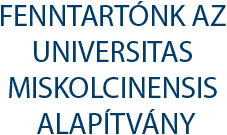NEW METHODS & APPROACHES NEEDED FOR COMPETITIVE HIGHER EDUCATION
The University of Miskolc hosted a two-day workshop where higher education leaders discussed the broadening opportunities for higher education with staff from the Hungarian branches of PricewaterhouseCoopers and Microsoft. The two main challenges are the changeover in university ownership and the effects of the coronavirus pandemic.
While it is still too soon to assess the changes brought about by the new model, the negative effects of the pandemic are clear: among them are restrictions on travel, difficulties for students in supporting themselves and their studies, obstacles to the flow of information, and the lack of personal contact. On the positive side, it has led to major progress in the integration of digital tools in education. While not a smooth, organic process, the first mainly online school year has been a success.
While progress has been made in the use of digital tools, this does not automatically lead to updated content; this is a challenge that is still ahead of us. Another ongoing issue is adjusting to the needs of the labour market in the course offerings of higher education. Artificial intelligence will lead to the loss of many jobs as soon as 2030, especially in data analysis sectors. It is even more important than ever that students acquire skills and competencies that allow them to be flexible.
In the Hungarian system, it takes three years to get a new programme up and running, which is much longer than in many European and neighbouring countries. The situation is like trying to turn around a massive container ship, whereas it needs to react as quickly as a motorboat. However, changes in the accreditation process are promised that will speed up the process and thus allow higher education to compete better with other educational institutions and programmes.
Another issue that was discussed is the eventual decline in state support for higher education, meaning that universities will have to consider whether specialisation is the best route forward. This would lead to closing down some programmes and concentrating on others to provide unique training programmes in areas of particular expertise.
The question is not whether core knowledge or job-specific training should be provided; both are needed. Skills for the 21st century are needed, along with an interdisciplinary approach and the integration of research results into teaching materials. The teaching approach has to be modified for today’s students, meaning that the digitalisation process must continue.


